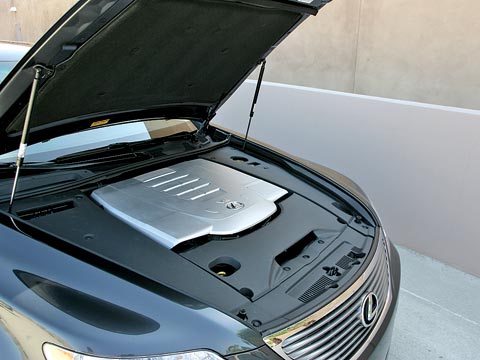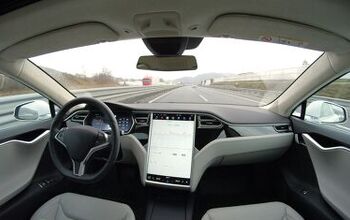Industry Opposes Mass "Right To Repair" Legislation Over Chinese Piracy Fears
Legislation aimed at improving the transparency of Technical Service Bulletins (TSBs) has passed the Massachusetts state House of Representatives, and awaits approval by the Senate. If approved, Bill 2517 [full text in PDF format here] would require that
The manufacturer of a motor vehicle sold in the commonwealth shall make available for purchase to independent motor vehicle repair facilities and motor vehicle owners in a nondiscriminatory basis and cost as compared to the terms and costs charged to an authorized dealer or authorized motor vehicle repair facility all diagnostic, service and repair information that the manufacturer makes available to its authorized dealers and authorized motor vehicle repair facilities in the same form and the same manner as it is made available to authorized dealers or an authorized motor vehicle repair facility of the motor vehicle.
The Alliance of Automobile Manufacturers is opposing the bill, according to the DetN, because it believes the bill is motivated by parts manufacturers who want access to parts in order to reverse engineer and sell them. Literally. And yes, it is China’s fault.
The AAM’s spokesman Charles Territo tells the DetN that
The passage of this legislation would set a dangerous precedent that could have a devastating impact on our economy. It would result in manufacturing jobs going overseas to places like China where the production of knock-off auto parts is big business
Even certain independent mechanics are on-board with the industry’s opposition to Right To Repair. Roger Montbleau of The New England Service Station & Automotive Repair Association tells the DetN
It has become clear that this bill is a wolf in sheep’s clothing. This bill will supposedly give independent repair businesses access to repair information and tools that car dealerships have at a similar price. Well, repairers can already do that
What independent shops don’t have access to is the software and TSB data that proponents say they need to ensure the safety of their customers’ vehicles. Moreover, proponents argue that a level playing field improves competition between dealers and smaller service shops, bringing the price down for consumers across the board. And as one small service station owner puts it
We don’t need to know how they build their vehicles, just how to repair them
That Territo picked the recent indictment of two alleged technology spies of Chinese extraction, accused of trying to sell GM hybrid technology secrets to the Chinese automaker Chery, is as telling as Growth Energy’s use of the BP oil spill to hype ethanol. Cheap symbolism comes and goes, but the simple fact is that repairing automobiles has become more and more difficult with time. And the companies that manufacture automobiles have every incentive to try to force consumers to use their “official” dealer network for maintenance. If manufacturers care as much about safety as they claim to in the post-Toyota recall environment, they should be happy to make sure that their customers are safe whether they choose to use dealer service or not.
With new legislation coming that should require mandatory black-box standards and other transparency measures, the automakers should consider the public relations benefit that could come from breaking ranks and coming out in favor of Right To Repair. After all, the public responds far better to cheap symbolism done in the name of popular transparency than in the name of protecting obscure (and in the case of the recent GM conviction, barely marketable) technology patents.
More by Edward Niedermeyer
Latest Car Reviews
Read moreLatest Product Reviews
Read moreRecent Comments
- Tassos Tim is not that good with colors.The bright "pink" is not pink, but FUCHSIA. Both colors may look good on a woman's sweater, but not on steel panels.
- Tassos While I was a very satisfied owner of a much earlier Accord COupe 5 speed (a 1990 I owned from 1994 to 2016), I don't like the exterior styling of this one so much, in fact the 2017 sedan looks better. Or maybe it sucks in white. The interior of my 1990 was very high quality, this one looks so-so. The 157 k miles were probably easy highway miles. Still, Hondas are not Toyotas, and I remember the same service (like timing belt replacement) back then cost TWICE for an Accord than for a Camry. Add to this that it has the accursed CVT, and it's a no. Not that I am in the market for a cheap econobox anyway.
- 3-On-The-Tree My 2009 C6 corvette in black looks great when it’s all washed and waxed but after driving down my 1.3 mile long dirt road it’s a dust magnet. I like white because dust doesn’t how up easily. Both my current 2021 Tundra and previous 2014 Ford F-150 3.5L Ecobomb are white
- Bd2 Would be sweet on a Telluride.
- Luke42 When will they release a Gladiator 4xe?I don’t care what color it is, but I do care about being able to plug it in.


































Comments
Join the conversation
The China angle is a red herring. Most of the parts are manufactured in China anyway. All a Chinese factory needs to reverse engineer a part is a sample of the part. This is about repair information, diagnostic codes etc. This has nothing at all to do with reverse engineering. In Europe, this information has to be provided to anybody who wants it since 2003 - and there we thought we were behind the U.S. Apparently, we were not. The repair business is a big moneymaker for both the dealership and the factory (overpriced original parts). Withholding repair information turns your into a hostage of the dealership, and they can extort any ransom payment they want. If I would tell you the marke-ups on some parts, you would vomit.
How absurd. An an electrical engineer at a Tier-1 automotive supplier in the early 1990s, I was appalled that we were directed to give our very latest microcontroller designs to GM in China to do copies of our latest North American designs. Give me a break, OEMs. You lie!